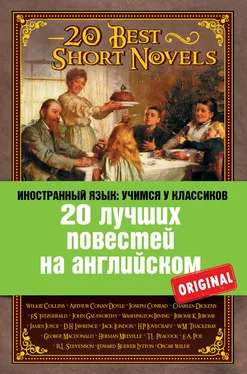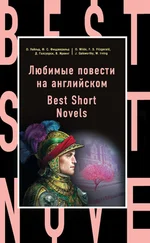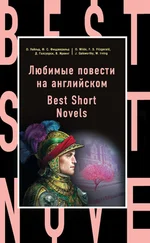‘Sir Wilfrid of Ivanhoe was a good lance,’ said the friar. ‘I have heard there was none better in Christendom. He lay in our convent after his wounds, and it was there we tended him till he died. He was buried in our north cloister.’
‘And there’s an end of him,’ said Athelstane. ‘But come, this is dismal talk. Where’s Wamba the Jester? Let us have a song. Stir up, Wamba, and don’t lie like a dog in the fire! Sing us a song, thou crack-brained jester, and leave off whimpering for bygones. Tush, man! There be many good fellows left in this world.’
‘There be buzzards in eagles’ nests,’ Wamba said, who was lying stretched before the fire, sharing the hearth with the Thane’s dogs. ‘There be dead men alive, and live men dead. There be merry songs and dismal songs. Marry, and the merriest are the saddest sometimes. I will leave off motley and wear black, gossip Athelstane. I will turn howler at funerals, and then, perhaps, I shall be merry. Motley is fit for mutes, and black for fools. Give me some drink, gossip, for my voice is as cracked as my brain.’
‘Drink and sing, thou beast, and cease prating,’ the Thane said.
And Wamba, touching his rebeck wildly, sat up in the chimney-side and curled his lean shanks together and began:
Love at two score
‘Ho! pretty page, with dimpled chin,
That never has known the barber’s shear,
All your aim is woman to win —
This is the way that boys begin —
Wait till you’ve come to forty year!
‘Curly gold locks cover foolish brains,
Billing and cooing is all your cheer,
Sighing and singing of midnight strains
Under Bonnybells’ window-panes.
Wait till you’ve come to forty year!
‘Forty times over let Michaelmas pass,
Grizzling hair the brain doth clear;
Then you know a boy is an ass,
Then you know the worth of a lass,
Once you have come to forty year.
‘Pledge me round, I bid ye declare,
All good fellows whose beards are gray:
Did not the fairest of the fair
Common grow, and wearisome, ere
Ever a month was passed away?
‘The reddest lips that ever have kissed,
The brightest eyes that ever have shone,
May pray and whisper and we not list,
Or took away and never be missed,
Ere yet ever a month was gone.
‘Gillian’s dead, Heaven rest her bier,
How I loved her twenty years syne!
Marian’s married, but I sit here,
Alive and merry at forty year,
Dipping my nose in the Gascon wine.’
‘Who taught thee that merry lay, Wamba, thou son of Witless?’ roared Athelstane, clattering his cup on the table and shouting the chorus.
‘It was a good and holy hermit, sir, the pious clerk of Copmanhurst, that you wot of, who played many a prank with us in the days that we knew King Richard. Ah, noble sir, that was a jovial time and a good priest.’
‘They say the holy priest is sure of the next bishopric, my love,’ said Rowena. ‘His Majesty hath taken him into much favor. My Lord of Huntingdon looked very well at the last ball; but I never could see any beauty in the Countess – a freckled, blowsy thing, whom they used to call Maid Marian: though for the matter of that, what between her flirtations with Major Littlejohn and Captain Scarlett, really—’
‘Jealous again – haw! haw!’ laughed Athelstane.
‘I am above jealousy, and scorn it,’ Rowena answered, drawing herself up very majestically.
‘Well, well, Wamba’s was a good song,’ Athelstane said.
‘Nay, a wicked song,’ said Rowena, turning up her eyes as usual. ‘What! rail at woman’s love? Prefer a filthy wine-cup to a true wife? Woman’s love is eternal, my Athelstane. He who questions it would be a blasphemer were he not a fool. The well-born and well-nurtured gentlewoman loves once and once only.’
‘I pray you, madam, pardon me, I – I am not well,’ said the gray friar, rising abruptly from his settle, and tottering down the steps of the dais. Wamba sprung after him, his bells jingling as he rose, and casting his arms around the apparently fainting man, he led him away into the court. ‘There be dead men alive and live men dead,’ whispered he. ‘There be coffins to laugh at and marriages to cry over. Said I not sooth, holy friar?’ And when they had got out into the solitary court, which was deserted by all the followers of the Thane, who were mingling in the drunken revelry in the hall, Wamba, seeing that none were by knelt down, and kissing the friar’s garment, said, ‘I knew thee, I knew thee, my lord and my liege!’
‘Get up,’ said Wilfrid of Ivanhoe, scarcely able to articulate: ‘only fools are faithful.’
And he passed on, and into the little chapel where his father lay buried. All night long the friar spent there: and Wamba the Jester lay outside watching as mute as the saint over the porch.
When the morning came, Wamba was gone; and the knave being in the habit of wandering hither and thither as he chose, little notice was taken of his absence by a master and mistress who had not much sense of humor. As for Sir Wilfrid, a gentleman of his delicacy or feelings could not be expected to remain in a house where things so naturally disagreeable to him were occurring, and he quitted Rotherwood incontinently, after paying a dutiful visit to the tomb where his old father, Cedric, was buried; and hastened on to York, at which city he made himself renown to the family attorney, a most respectable man, in whose hands his ready money was deposited, and took up a sum sufficient to fit himself out with credit, and a handsome retinue, as became a knight of consideration. But he changed his name, wore a wig and spectacles, and disguised himself entirely, so that it was impossible his friends or the public should know him, and thus metamorphosed, went about whithersoever his fancy led him. He was present at a public ball at York, which the lord mayor gave, danced Sir Roger de Coverley in the very same set with Rowena (who was disgusted that Maid Marian took precedence of her) – he saw little Athelstane overeat himself at the supper and pledge his big father in a cup of sack; he met the Reverend Mr. Tuck at a missionary meeting, where he seconded a resolution proposed by that eminent divine; – in fine, he saw a score of his old acquaintances, none of whom recognized in him the warrior of Palestine and Templestowe. Having a large fortune and nothing to do, he went about this country performing charities, slaying robbers, rescuing the distressed, and achieving noble feats of arms. Dragons and giants existed in his day no more, or be sure he would have had a fling at them: for the truth is, Sir Wilfrid of Ivanhoe was somewhat sick of the life which the hermits of Chalus had restored to him, and felt himself so friendless and solitary that he would not have been sorry to come to an end of it. Ah, my dear friends and intelligent British public, are there not others who are melancholy under a mask of gayety, and who, in the midst of crowds, are lonely? Liston was a most melancholy man; Grimaldi had feelings; and there are others I wot of: – but psha! let us have the next chapter.
Chapter V
Ivanhoe to the rescue
The rascally manner in which the chicken-livered successor of Richard of the Lion-heart conducted himself to all parties, to his relatives, his nobles, and his people, is a matter notorious, and set forth clearly in the Historic Page: hence, although nothing, except perhaps success, can, in my opinion, excuse disaffection to the sovereign, or appearance in armed rebellion against him, the loyal reader will make allowance for two of the principal personages of this narrative, who will have to appear in the present chapter in the odious character of rebels to their lord and king. It must be remembered, in partial exculpation of the fault of Athelstane and Rowena, (a fault for which they were bitterly punished, as you shall presently hear,) that the monarch exasperated his subjects in a variety, of ways, – that before he murdered his royal nephew, Prince Arthur, there was a great question whether he was the rightful king of England at all, – that his behavior as an uncle, and a family man, was likely to wound the feelings of any lady and mother, – finally, that there were palliations for the conduct of Rowena and Ivanhoe, which it now becomes our duty to relate.
Читать дальше
Конец ознакомительного отрывка
Купить книгу












